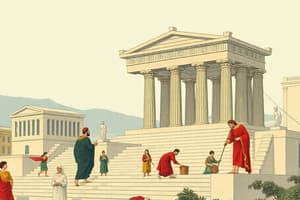Podcast
Questions and Answers
The first large scale ______ was developed in the city state of Athens.
The first large scale ______ was developed in the city state of Athens.
democracy
The ______ mill was an important invention used for metal shaping and agriculture.
The ______ mill was an important invention used for metal shaping and agriculture.
water
Ancient Greece is known for its significant contributions to ______ and architecture.
Ancient Greece is known for its significant contributions to ______ and architecture.
arts
The city-states of Ancient Greece were often changing their ______ which made unity difficult.
The city-states of Ancient Greece were often changing their ______ which made unity difficult.
Constant warring between the city-states weakened Greece and contributed to the ______ of the Greek Empire.
Constant warring between the city-states weakened Greece and contributed to the ______ of the Greek Empire.
Christianity emerged as a major world ______ during the Roman Empire.
Christianity emerged as a major world ______ during the Roman Empire.
The Isthmian Games were held at the Isthmus of ______.
The Isthmian Games were held at the Isthmus of ______.
The Roman Empire's decline and fall was one of the most dramatic ______ in history.
The Roman Empire's decline and fall was one of the most dramatic ______ in history.
Romans built bridges and aqueducts that relied on the engineering of ______.
Romans built bridges and aqueducts that relied on the engineering of ______.
Ancient Romans constructed grid-based cities characterized by a rectangle or ______ layout.
Ancient Romans constructed grid-based cities characterized by a rectangle or ______ layout.
Flashcards are hidden until you start studying
Study Notes
Ancient Greece
- Emerged around 4,000 years ago along the Aegean Sea.
- Expanded across 1,500 territories functioning as independent city-states.
- Athens developed the first large-scale democracy.
- Protected from foreign threats like the Persian Empire; notable battles include those led by Leonidas of Sparta against Xerxes of Persia.
- Greek soldiers revered as heroes, which influenced the creation of the Olympics focusing on physical competition.
- Major contributions to arts, architecture, philosophy (reason, ethics, natural law), language, and the alphabet.
Reasons for Decline
- Constant warring among city-states led to weakened defenses against enemies such as Rome.
- Social unrest as the poorer classes began rebelling against the aristocracy.
- Diverse government systems and shifting alliances weakened unity.
- Greek colonies shared culture but lacked strong ties to their mother city-states.
Contributions of Ancient Greece
- Water Mill: Innovated by Philo of Byzantium around the 3rd century BC for agriculture and milling.
- Odometer: Developed to measure distances for vehicles; evolved from mechanical to electro-mechanical designs.
- Olympic Games: Held every four years to celebrate athletic prowess and foster unity among Greek cities.
Ancient Rome
- Founded in the 8th century B.C. along the Tiber River and grew into a vast empire.
- At its peak, encompassed much of Europe, parts of western Asia, northern Africa, and Mediterranean islands.
- Roman legacies include the Romance languages derived from Latin and the widespread adoption of Christianity.
- Transitioned from a republic to an empire following Julius Caesar's era; Augustus initiated a golden age of peace and prosperity.
- Experienced a dramatic decline and fall by the 5th century A.D.
Contributions of Ancient Rome
- Arches: Pioneered the use of arches for infrastructure, leading to innovative architecture like aqueducts and the Colosseum.
- Grid-Based Cities: Designed urban layouts with rectangular or square grids, foundational for modern city planning.
- Dams: Constructed enduring structures, some still in use after 1,900 years, showcasing advanced engineering.
Technological Innovations in Ancient Greece and Rome
- Alarm Clock: Greek designs utilized water mechanisms; Plato reportedly used a version to signal lectures.
- Cartography: Anaximander created early world maps featuring inhabited areas, with Ionia at the center.
- Olympics: Dedicated to the Olympian Gods, it included various competitions; participation was limited to Greek men only.
Studying That Suits You
Use AI to generate personalized quizzes and flashcards to suit your learning preferences.



